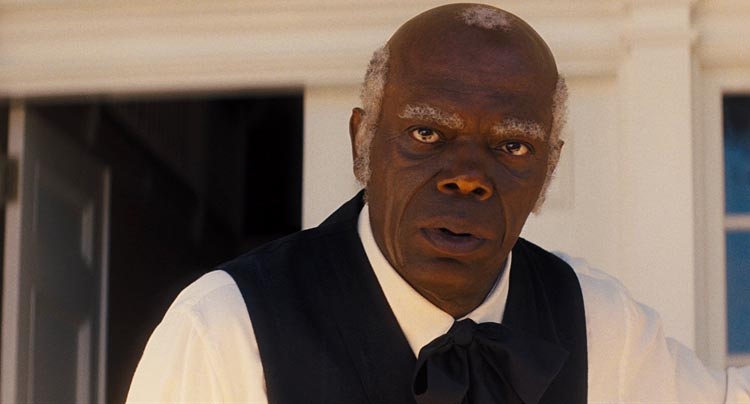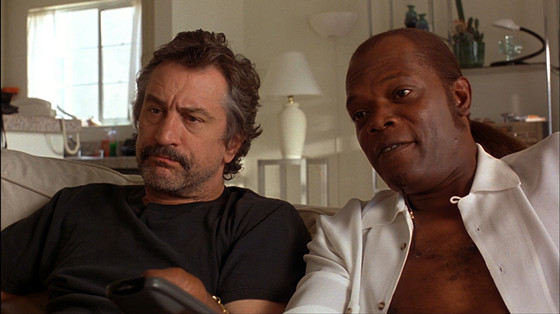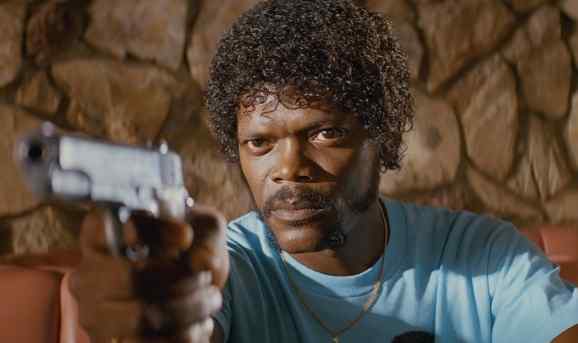3. Django Unchained (2012)

Samuel L. Jackson has talked a lot about Stephen in Django Unchained. The role to envy is Django himself. He starts as a slave but transforms into a charismatic bounty hunter who ends the film burning down a plantation. Of course, Jackson would want to play a character who carries so much meaning, who ends the film on such a note of catharsis. Alas, by the time Tarantino wrote the script, Jackson was too old for the lead. Instead, he asked Jackson to play Stephen. Playing a revolting side piece to Calvin Candy, who loudly and crudely expresses his hatred for Django and deference for the plantation he works on may not be the appealing role Jackson wanted, but that does not mean he did not fully commit.
Stephen is Jackson deeply understanding his own role. He knows how to say each word and look at Django in such a way that every second of him onscreen is a second that fuels the audience with rage. He also understands the power Stephen commands. He capitalizes on knowing that Stephen is a wolf in sheep’s clothing, who commands authority and rank by pitifully pledging his allegiance to the plantation he works on. As a character, maybe he is not bursting at the seams with nuance like some of Tarantino’s top tier creations. As an acting job, Jackson could not have done a better job.
2. Jackie Brown (1997)

Ordell Robbie is a reflection of Jackie Brown as a film. Jackie Brown is Tarantino’s cooldown after Pulp Fiction. It is so much more laid back; the exact maneuver people did not expect from Tarantino. And Ordell is not a straightforward Samuel L. Jackson performance. Ordell is so different from other movie crimes bosses. He is not an explosive entity overthrowing entire scenes. He is not a cool, calm, and collected boss who knows every move other people are going to make.
Ordell is much quieter than Jules but also more ruthless. There is certainly something frightening to him, but he is never fully in control. Jackie has him at gunpoint in one instance. He is this fascinating concoction of so many years of movie criminals. He is neither brilliant nor incompetent. Like everyone else in Jackie Brown, he is undeniably average, which makes him an intriguing foil for an equally flawed Jackie. And Jackson plays him in a suitable subdued manner that keenly matches the mellowed out feeling of the film itself, a move that also makes his outbursts all the more shocking. Ordell is like Jackie Brown itself. Every now and again, you just have to remind people how good each one is.
1. Pulp Fiction (1994)

What else could it be? What else could it actually be? It is the role that sent Jackson into the stratosphere. It is the character that may remain Tarantino’s best. If Jules does not work, Pulp Fiction does not work. The fanciful nature of its time jumping may still have intrigued critics and moviegoers alike, but without a lead like Jules and a performance like Jackson’s, it does not entrance people in quite the same way. Pulp Fiction has many stories to juggle, but at the end of the day, it is Jules’ story of change.
This is a film filled with nastiness, with language and violence but the end is Jules choosing to leave the world he inhabits behind. He is the one character who leaves on his own terms, who changes his very nature in an attempt to be a better man. Jackson’s opening apartment rant is exquisite. It is a masterful introduction of a character and an actor influencing a whole generation on how to command a scene.
While Jackson’s career is defined by the demeanor in that scene, it is Jackson’s performance after that moment that made the character indelible. He gets every shade of Jules correct. When he is trying to bullshit with his friend Jimmy, when is merely trying to be respectful and get a job done with The Wolf, when he is summarizing his new lease on life in the café shop.
In every scene after Jules’ near-death experience, Jackson gives his character a new level of meaning. He is building, in every scene, to a changed human being by the film’s end. You can see on Jackson’s face the old Jules. At any moment he can revert to the badass motherfucker we saw at the beginning. Hell, he may be closer to that than the changed man he wants to be. But through Jackson, we see a man genuinely wanting to change. His and Tarantino’s take on this classic arc is immaculate, and it has to be number one.